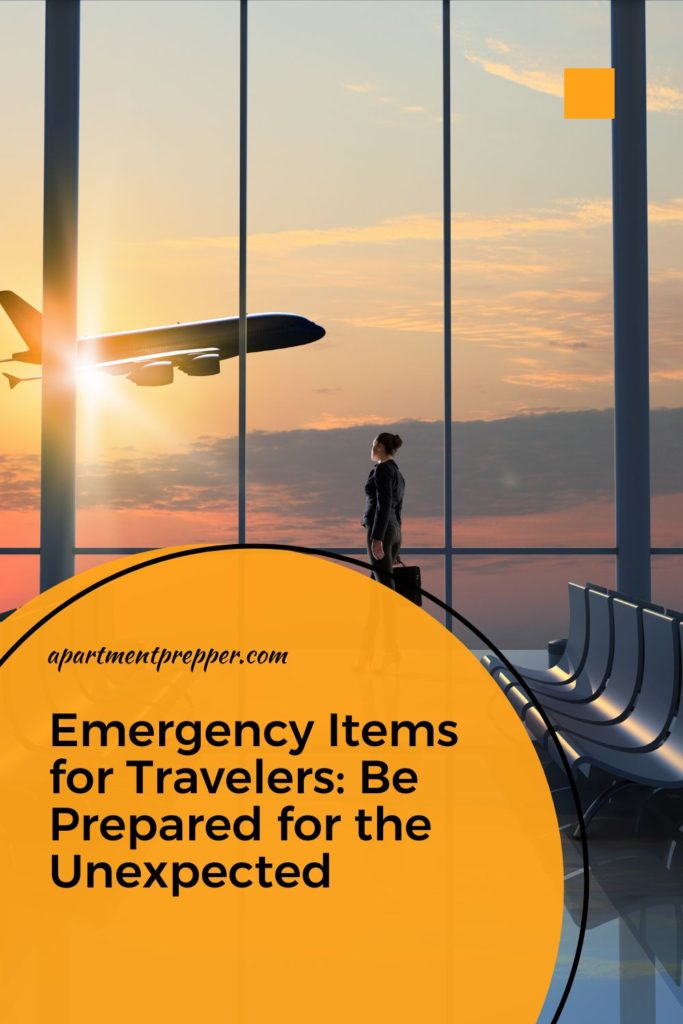Written by Bernie Carr
A big part of the excitement of planning a trip is packing for all the activities you have in mind. However, unforeseen events can occasionally disrupt even the most well-organized plans.
Recently, my nephew went on a long-awaited trip to Japan. He had a great time during the first two weeks, but soon after, he came down with a severe upper respiratory infection. He did take a mini first aid kit which provided relief until he went to a doctor. Whether it’s a sudden storm causing a power outage, an illness, or a natural disaster limiting access to services, being equipped with a few emergency supplies can make a significant difference in handling unexpected situations comfortably and confidently.
Essential items to pack
Water: Ensure Hydration in Uncertain Situations
No matter where you go, water is a fundamental necessity. Water is heavy so packing water itself might be challenging. Consider carrying a personal water filter or a water filter bottle as a backup in case the water supply is interrupted. Alternatively, you can purchase water bottles upon reaching your destination to ensure a steady supply of safe drinking water throughout your stay.
Food: Satisfy Hunger Even in Unforeseen Circumstances
While many travelers rely on local restaurants for meals, it’s essential to be prepared for emergencies when these establishments may be closed. Pack easy-to-consume food options such as nutrition bars, dried fruit, nuts, and crackers. Additionally, a few indulgences like chocolate or candy can provide comfort during stressful times.
Cash: Ensure Financial Flexibility
During a power outage, stores may be unable to process debit or credit card payments. It’s wise to carry a small amount of cash for necessities and keep loose change on hand for hotel vending machines.
First Aid Kit: Address Health Emergencies
Include a well-stocked first aid kit to handle potential health emergencies during your vacation. Some over the counter medicines and supplies include:
- Pain relief/ fever reducer such as acetaminophen, aspirin, or ibuprofen
- Diarrhea medicine (Imodium or Pepto-Bismol)
- Antacid
- Antihistamine such as Benadryl or Zyrtec
- Motion sickness medicine
- Cough suppresant, or expectorant
- Sinus medicine/Decongestant
- Adhesive bandage (Band-Aid)
- Antibiotic ointment (Neosporin)
For a comprehensive list, see Pack Smart on the CDC’s website. Don’t forget hand sanitizer and masks, as some regions may still require them.
According to the Centers for Disease Control (CDC), bring extra doses of prescription medications in their original containers, along with essential medical supplies like spare glasses, contacts, Epipen, diabetes supplies, and more. Keep a copy of your prescriptions easily accessible as recommended by the U.S. State Department. If traveling internationally, check the International Narcotics Control Board (INCB) website for any restricted substances in your destination country.
Portable Power Bank: Stay Connected Amid Power Outages
To extend the battery life of your smartphone during electricity disruptions, carry a portable power bank. As an additional means of communication, bring a prepaid long-distance card for making calls when cellular service is unavailable or to avoid roaming charges.
Emergency Gear: Be Ready for Various Situations
Include a small flashlight or headlamp in your luggage to navigate through power outages. An emergency whistle can be a lifesaver in inaccessible areas, allowing you to call for help. Antibacterial wipes and personal cleansing cloths are useful for maintaining hygiene when water becomes scarce. You’ll also need sunscreen and insect repellent. Don’t forget to pack at least one pair of closed-toe, comfortable shoes in case you need to walk in muddy conditions.
Bonus tip
Do your research
To be prepared, do some research on the area you will be visiting before you go. Find out what are the most likely natural disasters that can happen. Be aware of any travel advisories. Know the areas that are safe for tourists.
Check the TSA website on what’s allowed in your carry on bags. You may have to secure some items in your checked luggage.
The final word
While the likelihood of experiencing an emergency during your trip is low, being prepared with essential emergency items provides peace of mind and ensures your safety and comfort in unexpected situations. Pack these recommended supplies and enjoy your travels with confidence, knowing you’re ready to face any challenge that may arise.
Today’s societal climate not supportive of prepping. With your help, we can keep bringing you content that is often suppressed. Help keep Apartment Prepper alive.
Join me on Patreon for ad-free content.
Or Help out via Paypal
About the author
Bernie Carr is the founder of Apartment Prepper. She has written several books including the best-selling Prepper’s Pocket Guide, Jake and Miller’s Big Adventure, The Penny-Pinching Prepper and How to Prepare for Most Emergencies on a $50 a Month Budget. Bernie’s latest e-book, FRUGAL DIY has just been released on Amazon. Her work appears in sites such as the Allstate Blog and Clark.com, as well as print magazines such as Backwoods Survival Guide and Prepper Survival Guide. She has been featured in national publications such as Fox Business and Popular Mechanics. Learn more about Bernie here.
FB: https://www.facebook.com/apartmentprepper
Instagram: https://www.instagram.com/apartmentpreppers/
Twitter: https://twitter.com/AptPrepper
YouTube: https://www.youtube.com/channel/UC7vOtdbo-wiBeBxD6puCr1Q
Pinterest: https://www.pinterest.com/aptprepper/




